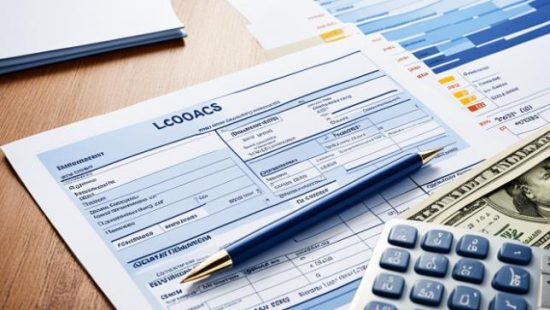
Loan proceeds are key in borrowing money and are vital for personal finance. When you borrow money, the loan proceeds are the funds you get from the lender. These funds can be used for things like education, buying a house, or starting a business. It’s important to know how loan proceeds work and their effect on your finances. Since you’re borrowing money, you must pay it back, often with extra interest.
Loan proceeds come from various loans, like personal loans, mortgages, and student loans. Each loan has its own rules and conditions that borrowers must follow. This includes knowing about interest rates, repayment plans, and any extra fees or costs. Understanding what are loan proceeds that helps you to make smart financial choices and manage your debt well. Knowing about borrowing details, like loan amounts and fees, and the benefits and duties of borrowing, boosts your confidence in the borrowing process.
What is Loan Proceeds?

When you borrow money, you might hear about “loan proceeds.” But what does this term mean? It’s key to know this when handling your borrowed funds well.
The Basics of Loan Proceeds
Loan proceeds are the actual money you get when you borrow. They are the total amount you get, minus any fees, taxes, or expenses. So, they’re the funds put into your bank account or given to you directly.
To figure out loan proceeds, subtract fees like origination fees, closing costs, or insurance premiums from the loan’s total. What’s left is the money you can actually use.
Understanding Loan Amounts VS. Loan Proceeds
It’s vital to know the difference between loan amounts and loan proceeds. Loan proceeds are the funds you get after all deductions. Loan amounts are the total you borrow before any fees are taken off. Loan amounts often include extra fees that lower the loan proceeds. These fees can include origination fees, application fees, underwriting fees, closing costs, and prepayment penalties.
Common Loan Fees and Expenses
- Getting a loan means knowing about the fees and expenses you might face. These can affect how much money you get from the loan. Understanding these costs helps you make smart financial choices and avoid surprises.
- One common fee is the origination fee. Lenders charge this to process your loan. It’s a percentage of the loan’s total amount.
- Application fees are also common. Borrowers pay these to cover the cost of reviewing and processing their loan application.
- Other expenses might include processing fees or prepayment penalties. These vary by loan type and lender.
- For loans like mortgages, there are extra costs. These might be appraisal fees, title insurance, or mortgage insurance premiums.
- It’s important to read the loan terms carefully. This way, you’ll know all the fees and how they’ll affect your loan proceeds. You can then plan your finances better.
What Are Loan Proceeds Used For?
When you borrow money, you can use the loan proceeds for many things. This depends on the loan type and your needs. It’s key to know how you can use these funds to make smart financial choices. Let’s look at the main types of loans and how you can use the money.
Common Types of Loans and Their Proceeds
There are many kinds of loans, each for different financial needs. Personal loans can be for paying off debt, improving your home, or covering emergencies. These loans let you use the money as you need, helping you manage your finances. Mortgages help you buy or refinance a home. The money from a mortgage can only be used for real estate. This means you get the funds to buy your dream home or invest in your current property.
Auto loans give you the money to buy a vehicle. With these loans, you can pay back the amount over time. This makes it easier to finance your car or truck. Student loans are for education costs. They cover tuition, books, and other school expenses. These loans help you fund your studies.

Restrictions on How You Can Use Loan Proceeds
Loans offer flexibility in how you use the money, but some have limits. For example, student loans are only for school costs and not for other things. Mortgages are for buying or refinancing property and not for other financial needs.
Before getting a loan, read the terms carefully to know the rules on using the money. This way, you make sure the funds are used right and follow the lender’s rules.
Benefits and Responsibilities of Borrowing
Borrowing money through loans can help you manage your finances and achieve goals like buying a home, starting a business, or going to college without depleting your savings. It also helps build or improve your credit history, making future borrowing easier and potentially cheaper. Using loans wisely can enable financial success by reaching goals that might otherwise be unattainable. However, borrowing comes with responsibilities, such as making regular payments and understanding loan terms to avoid late fees and credit score damage. Always consider the impact of interest rates and fees on your finances before taking a loan.
Are Loan Proceeds Considered Income?
When you borrow money, it’s key to know how it affects your taxes. Loan proceeds aren’t seen as income because you must pay them back. They don’t add to your wealth or taxable income like a job or investments do. But, some loans or situations might have tax rules you need to follow. If that’s the case, talking to a tax expert or financial advisor is a good idea. They can explain the tax rules that apply to you.
Forgiven loans or canceled debts could lead to tax obligations. If a loan is forgiven, you might have to pay taxes on it. You’ll need to report it on your taxes. Knowing about these rules and getting advice is important to follow the law. To sum up, loan proceeds usually aren’t seen as income. Yet, there are times and situations that could change this. Getting advice from a tax pro or financial advisor is wise. They can guide you through any tax issues and make sure you meet your tax duties.
Repayment Of Loan Proceedings
Repaying a loan is a key part of borrowing. After getting the funds, you must pay back the loan, plus interest, fees, or charges. It’s vital to know the repayment details in your loan agreement. Lenders set up a repayment plan when you borrow. This plan tells you how much to pay and when. Sticking to this plan is important to avoid problems.
If you don’t pay back the loan, it can hurt your credit scores. This makes getting loans or credit hard later. The lender might also start collecting what you owe, which can be stressful. In extreme cases, they could take legal action.
Credit Scores and Loan Proceeds
When you take out a loan, how you handle the money matters a lot for your credit scores and creditworthiness. Knowing how loan proceeds affect your credit scores is key to keeping a good credit score. This helps you get better loan terms later on. It’s vital to pay your loan back on time. This builds a good credit history and can boost your credit scores. Paying consistently shows lenders you’re a reliable borrower. This can make you more likely to get credit in the future.
Here are some tips:
- Make loan payments on time: Pay your installments right away to build a good payment history.
- Manage your debt-to-income ratio: Keep your debts low compared to your income to show you’re financially responsible.
- Monitor your credit reports: Check your credit reports often for mistakes and fix them quickly.
- Diversify your credit mix: Having different kinds of loans, like credit cards and mortgages, can help your credit scores.
- Avoid excessive credit applications: Too many credit checks can lower your scores, so apply for credit wisely.
By doing these things, you can make sure loan proceeds help your credit scores and creditworthiness. Keeping your credit in good shape means you’ll have an easier time getting loans and getting good terms later.
Differentiating Between Secured and Unsecured Loan Proceeds

When you borrow money, you can get it through secured or unsecured loans. It’s important to know the differences to understand the risks and benefits of each loan type. Secured loans need collateral, like a car or a house, which the borrower promises to the lender. If the borrower can’t pay back the loan, the lender can take the collateral. Secured loans have lower interest rates and better terms because of this extra security.
Unsecured loans don’t need collateral. They rely on the borrower’s credit score, income, and job stability. These loans are easier to get since you don’t need to offer any assets. But, they have higher interest rates and are harder to get because they’re riskier for lenders.
FAQs on Loan Proceeds
Can I use loan proceeds for any purpose?
The use of loan proceeds depends on the type of loan. Some loans, like personal loans, offer flexibility in how the funds are used, while others, like auto or home loans, must be used for specific purposes.
What are the benefits and responsibilities of borrowing?
Borrowing money can help you in many ways, like getting funds for big purchases or improving your credit. But, it also means you have to make regular payments and manage your debt well. Think carefully about your finances and goals before borrowing to use the money wisely.
Are loan proceeds considered income?
No, loan proceeds are not seen as income. They are borrowed money that you must pay back. But, some loans might have tax implications. It’s best to talk to a tax expert to understand your situation.






